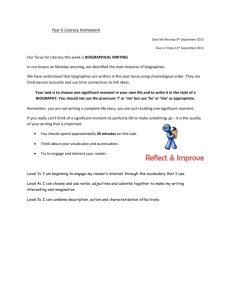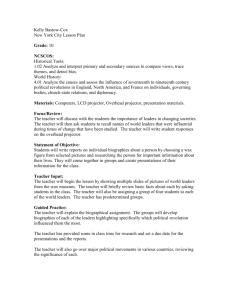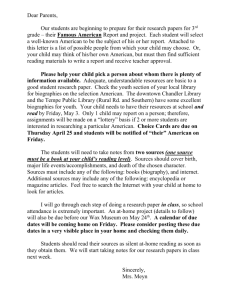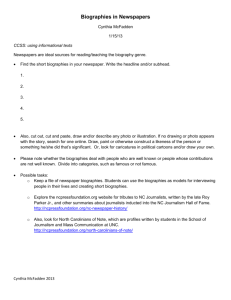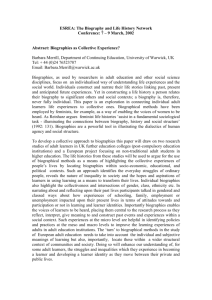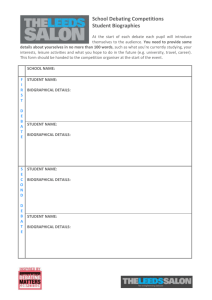Paper presented at SCUTREA 34th Annual Conference, University
advertisement
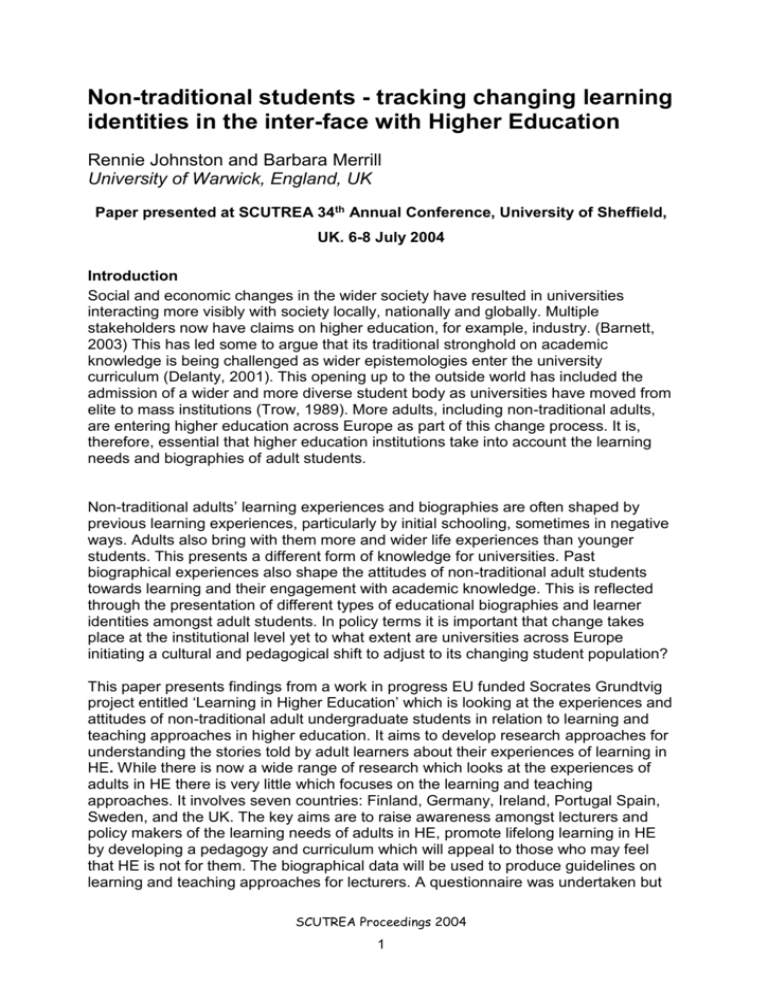
Non-traditional students - tracking changing learning identities in the inter-face with Higher Education Rennie Johnston and Barbara Merrill University of Warwick, England, UK Paper presented at SCUTREA 34th Annual Conference, University of Sheffield, UK. 6-8 July 2004 Introduction Social and economic changes in the wider society have resulted in universities interacting more visibly with society locally, nationally and globally. Multiple stakeholders now have claims on higher education, for example, industry. (Barnett, 2003) This has led some to argue that its traditional stronghold on academic knowledge is being challenged as wider epistemologies enter the university curriculum (Delanty, 2001). This opening up to the outside world has included the admission of a wider and more diverse student body as universities have moved from elite to mass institutions (Trow, 1989). More adults, including non-traditional adults, are entering higher education across Europe as part of this change process. It is, therefore, essential that higher education institutions take into account the learning needs and biographies of adult students. Non-traditional adults’ learning experiences and biographies are often shaped by previous learning experiences, particularly by initial schooling, sometimes in negative ways. Adults also bring with them more and wider life experiences than younger students. This presents a different form of knowledge for universities. Past biographical experiences also shape the attitudes of non-traditional adult students towards learning and their engagement with academic knowledge. This is reflected through the presentation of different types of educational biographies and learner identities amongst adult students. In policy terms it is important that change takes place at the institutional level yet to what extent are universities across Europe initiating a cultural and pedagogical shift to adjust to its changing student population? This paper presents findings from a work in progress EU funded Socrates Grundtvig project entitled ‘Learning in Higher Education’ which is looking at the experiences and attitudes of non-traditional adult undergraduate students in relation to learning and teaching approaches in higher education. It aims to develop research approaches for understanding the stories told by adult learners about their experiences of learning in HE. While there is now a wide range of research which looks at the experiences of adults in HE there is very little which focuses on the learning and teaching approaches. It involves seven countries: Finland, Germany, Ireland, Portugal Spain, Sweden, and the UK. The key aims are to raise awareness amongst lecturers and policy makers of the learning needs of adults in HE, promote lifelong learning in HE by developing a pedagogy and curriculum which will appeal to those who may feel that HE is not for them. The biographical data will be used to produce guidelines on learning and teaching approaches for lecturers. A questionnaire was undertaken but SCUTREA Proceedings 2004 1 biographical approaches have been central in giving voice to and understanding the learning experiences of non-traditional adult students. Interviews have also been conducted with a sample of lecturers to examine their teaching approaches and teaching biographies. The recent turn to biographical methods in adult education and the social sciences more generally (Chamberlayne et al, 2000) has pushed the boundaries and depth of understanding in relation to the learning experiences of adults. In particular life stories demonstrate how learning experiences are shaped by the dialectics of agency and structure. Biographical approaches are a useful tool for bridging the agency/structure, macro/micro divide within sociology as they reveal how individuals both act upon the world as well as being shaped by it. The biographies of learners in this study reveal that learning in university is both an individual and collective experience. Adult learners bring with them particular attitudes and experiences to learning which have been shaped by class, gender, race etc. At the same time engaging in learning for a degree, particularly in the social sciences, may raise awareness of their structured position and encourages non-traditional learners to change their lives. As Brah (1992) points out experience is essential as a means of making sense narratively and symbolically of the life struggle over material conditions. Biographies illustrate the multiple roles and identities which characterise the lives of adult learners and how these also impact upon their learning. Biographies and learning are not encountered as an individualised process. They are located within a network of social relationships both inside and outside the university. As Denzin highlights: We must learn how to connect biographies and lived experiences, the epiphanies of lives, to the groups and social relationships that surround and shape persons (1989, p.82). The narrated life is a construction of the first order. Events and life experiences are selected by the narrator focusing not only on the actor's self but also on the interaction with others significant to their life history within specific social contexts. The narrator is both narrating and interpreting their biography. As researchers we also interpret the biographies at another level (construction of the second order) in order to identify the 'process structures' of the lifecourse (Schűtze, 1984). Although appearing to be individualistic, biographies highlight the collectivities in people's lives by identifying, as Bertaux (1981) reminds us, the common experiences of structure: The intent of the biographical project is to uncover the social, economic, cultural, structural and historical forces that shape, distort and otherwise alter problematic lived experiences (Bertaux, 1981, p.4). The methodological and theoretical frameworks draw on and extend previous models used in a TSER European project. The latter looked at the access and experiences of adults in higher education and involved several of the same partners. The biographies of the adult students in the partner countries revealed a number of common patterns of behaviour in their educational careers. As in the previous project we are drawing on Bourdieu's work on habitus to identify different educational SCUTREA Proceedings 2004 2 biographies. Adults construct and make sense of their learning experiences in higher education within a framework of a particular habitus which can either constrain, enhance and/or empower their learning and change identities. Analysis of the biographies revealed the existence of five types of educational biographies as identified in the previous project: ‘patchworkers’, ‘educational climbers’, ‘integrators’, ‘emancipators’ and ‘careerists’ (Alheit and Merrill, 2001; Alheit and Merrill, forthcoming). This current study has revealed further educational biographies constructed by particular cultural contexts, for example, ‘hesitators’ in Sweden and ‘marginalisers’ in Portugal. While many biographies exhibit a dominant type, others cut across the boundaries of one or more types. What they do reveal is that biographies, while being individual, are also collective in the ways in which learners both construct their learning and their lives as well as being shaped by the structures they inhabit. It is what C Wright Mills (1959) refers to as 'the personal troubles of milieu' and the 'public issues of social structure' (p.14). Applying Bourdieu's concept of habitus enables us to highlight the dialectics of structure and agency in biographies. For Bourdieu the habitus is 'the site of the internalization of reality and the externalization of internality' (1977, p.205), it is a set of dispositions which incline agents to react in certain ways. Learning in HE enables the individual to reflect upon and understand past biographical experiences in order to build and create changed and future identities The second half of this paper will first explore, using learner biographies, how initial learning identities are constructed through schooling linked to wider factors such as the influence of class, gender and race. It will then trace briefly how these learner identities develop beyond school, looking finally at how they are mediated by different factors within HE. These include mode of study, home/university connections links or dissonances, interactions with peers, interactions with tutors, and teaching, learning and assessment methods. For the purposes of this paper we will focus only on the inter-face with HE culture and teaching and learning methods. We hope to use these different stories to generate new understandings about non-traditional students in HE and to identify the implications of this for policy and practice, and for learning and teaching in HE. How initial learner identities are constructed This section will look in some depth at some of the key initial influences on learner identity. Experiences of learning in school as children and adolescents influenced many of the UK participants' attitudes and motivation to learning as an adult. School for some was experienced in contradictory ways as several participants stated that they did not enjoy school but as they continued their story admitted to liking some aspect, usually a particular subject. As one woman stated 'I hated school' but soon after remarked that 'I very much liked art and dressmaking - practical things rather than the academic things'. Her dislike of school was shaped by her experiences of teachers rather than the learning process as there was one in particular who bullied her. This memory stayed with her and undermined her confidence as a learner although as she stated 'I knew I knew things' and had intended to stay on at school to take the qualifications required for university. Similarly one male participant recalled that he was also bullied by teachers and other pupils in his school in East London SCUTREA Proceedings 2004 3 causing him to dislike school. However, he proceeded to explain that at secondary school some teachers were influential: They cared about the subject and it was enjoyable to be there. Like I remember doing history. We had a history teacher and he was excellent. English wasn't so bad and there were certain subjects that were really good. Others found themselves labelled by teachers as troublemakers – a legacy of an elder sister or brother who had been labelled as disruptive. Jane, who is now in her 40s, outlined: I came from an unpopular family if you like…The minute my surname was known then it was like the next scapegoat and I was more or less told to sit in the corner and keep your mouth shut and I was told I would probably work cleaning streets or something like that. My school experiences I would say, were horrific and very, very unhappy. I didn't enjoy school - I didn't seem to be able to get into the group I was always on the edge of the group and felt very alone. Because of that I was very disruptive. Jane is now very enthusiastic about learning and is currently finishing a 2+2 Social Studies degree. Mark also came from a difficult family background but unlike Jane used learning in school as a means of escaping from it: I always did like going to school. I moved around a few primary schools. I passed my 12+ and went to a grammar school. I think the reason I enjoyed going to school so much was that home life and domestic life was sort of up in the air and also other issues which made me delve into my schooling and education. My brother went the other way and ended up in a life of crime. I found almost solace in going to school - that's why I enjoyed it. I put the time in and did quite well. Yes it was a positive experience. Although they had different experiences of school, both Jane and Mark clearly remember key teachers who supported their learning, Mark putting it this way: There were two people that…..probably took an hour out of their time over a period of years to talk to me one-to-one, how’s it going sort of thing and took an interest. Several other participants mentioned that their schooling had been disrupted as their family moved around the country and were constantly changing schools and others experienced disruptions through long-term illnesses or absences from school. But others did not find it easy to fit into the school culture, perhaps as a result of class differences. Peter, now an active trade unionist found it particularly difficult to cope with school routine and didn’t have much time for authority although he liked some teachers. Catherine, another trade unionist, ‘liked the lessons in the classroom and finding things out. I was always in the library reading’, but she never felt she fitted into secondary school: SCUTREA Proceedings 2004 4 I was never very good at sports and things and I think that stumped me at school….I didn’t go around with people in that school in my own time. It was just go to school and come home. Looking back on her schooling, Paula, who got a good degree and has now gone into teaching, felt short-changed by her school: Yes, (I was) well behaved and got on with my work. I just feel that there was a lot of potential that I had. Too young at the time to know but I do feel it came back to my background and my family and where I lived and that influenced how they treated me and that’s why college was never even mentioned. ….I think the system could have done more for me In looking at the experiences of these working-class students, it could be said that while they were developing their learning and their learning identities, their workingclass habitus did not easily fit with the more middle-class culture of the school. In contrast to this, outside activities were often much more influential in changing the learner identities of these working-class students. As an apprentice, Peter’s antiauthoritarianism drew him first to science fiction, then to surrealism and finally to punk: Yes I ….got involved with Punk and all that and the anarchist stuff that got me into anarchist theory and those sort of things…..They sort of lived their life ….they were getting away from hypocrisy. If you bought a single it tended to be this great big sort of fold out thing full of various ideas, contacts for various things. I mean animal rights, C and B, the whole thing In contrast, Paula went into banking for 10 years, but after a while was …questioning the moral issue of the job I was doing and I thought I can’t do this for the rest of my life…I just thought there had to be more to life than this. This feeling prompted Paula to start getting books on sociology and politics out of the library and then to apply for an access course. Jane expressed herself in a slightly different way. She had her first child at the age of 18 and two more shortly afterwards, so returned to working in a factory as she needed the money. She explains: …it wasn't until I got to 40 and I had hit the early menopause and I was like breaking up and I didn't know what was happening and I wanted to find out who I was. Returning to education didn't give me just the academic skills it gave me something about me. All of a sudden instead of being a mum I knew I was Jane. Access to Higher Education, changing habituses and new learner identities For Paula and Jane, moving into HE arose from a crisis in their lives and conferred on them an opportunity to develop a new identity and status, an outcome often particularly identified amongst women. This was also true for Mark as HE gave him a chance, now as a new father, to move from a casual, portfolio-type working existence to take on a more coherent and responsible identity. For the trade unionists interviewed, Peter, Catherine and Tom, the situation was rather different. They SCUTREA Proceedings 2004 5 already had a strong and positive working identity and HE was for them only an extension of this. What it offered them was the chance to re-kindle their learning identities and personal ambitions whilst also developing their knowledge and work as trade unionists. Because they were taking a degree that had been purpose-designed for them and were taught all together on block release and because they all had experience of leadership, the trade unionists did not find HE culture particularly daunting. They were happy to pick up knowledge and ideas from tutors and books and then work on these in their own time, often supporting each other in regionally based sub-groups. However the one thing which they all found difficult and irritating about HE was the rigidity of deadlines and timescales. Lecturers were too geared to younger students in this respect and did not take account of the busy lives of their trade union students. As Peter put it: God help you if you have a strike or something like that but certainly if you get a rush of personal problems ..you are always running tight. This view was shared by almost all mature students. Working alongside younger students, Paula felt aggrieved that: … some of the lecturers treat all the students the same and we aren’t all the same…if a mature student asks for an extension….it’s not usually because they have been partying ….there is usually a genuine excuse and (some lecturers) aren’t prepared to listen. The learning identity of full-time students changed in its interface with HE but some elements remained. Paula’s belief that people and institutions have made assumptions about her continued as an adult student at university. While at one level she thrived in HE through her love of the subject, well-developed reading, reflective approach and highly developed organisational skills, she still lacked confidence in an university environment You never lose that. I don’t think you ever lose that – you learn to live with it but you don’t ever lose that. You always think I am not worthy of this. That’s something I feel and you still think that you shouldn’t be here and you are a con – you know how did I get here and I slipped through the net and I shouldn’t be here. Kathy, a 2+2 student, also talked about her feelings of not being worthy to be a university student. This was perceived by her in class terms. In one seminar group she was aware that some of the young female students came from a very middle class background because of their accent and lifestyle. The confident way they talked in seminars undermined her learning confidence: But those girls…they just made you feel thick. In the third year you do feel thick and you do feel that you shouldn't be here and you do feel old and feel really on show and I don't particularly like that. However, generally, the 2 +2 structure helped mature students adjust to mainstream university culture. For example, Mark, ‘a working class dodgy-looking geezer’ had SCUTREA Proceedings 2004 6 visited the main campus during his college years so was able to take on a different, more confident role as ‘Mr Helpful’: So yes, I kind of help people around. I was the one that put everyone together for a couple of weeks just checking on them and saying ‘hello’ and I would stop and talk. In a different way and despite some initial anxieties about accessing the campus, at a more micro level, Jane was able to use her out-going personality as well as select particular courses where she was accepted: I was the eldest person in the seminar group and I think because I was my opinion was valued…….the seminar tutor always used to say how are your grandchildren, So not only was she interested in me as student she was interested in me as a person. This was recurring theme in that mature students were largely happy to adapt to HE culture and methods and so gradually change their learning identity but they also wanted to be recognised and respected as people who had something to offer the ongoing debate. For this reason, most mature students’ favoured teaching and learning method was the seminar. Jane took this seriously: When you go into the seminar you have got something valuable to say because you have read your stuff and you know what you are talking about. Paula agreed: Obviously with ….group discussions I think you get a lot out of mature students particularly. I liked that. The only downside I would say is that there are some staff who perhaps don’t appreciate the outside experience that mature students can bring. ...You probably know more about ‘the real world’ than they do and I think it’s that (that is frustrating), dismissing the fact that you do know about these things because they don’t fit in the theory that they talked about. Mature students, because of their more extensive and varied learning biographies, tended to see themselves as independent learners. Jackie put it this way: I see learning as putting your own mark on it and listening to other people’s ideas about the subject and then hopefully getting some kind of resolution. ….(On the main campus) I was spoon fed a load of facts and figures, a lot of the time I felt I needed a dictionary to know what was being said and sometimes I would look stupid because maybe I wouldn’t know the right word or the terms. This ‘spoon-feeding’ did not sit well with mature students’ image of themselves as independent learners. In the light of this, some adopted clear tactics to avoid it and make the most of their more independent learning identities. Thus the trade unionists, aided by their block release, used their weeks at university to pick up key ideas and books to work on, often collectively, in their own time and at their own pace. Mark soon worked out that he SCUTREA Proceedings 2004 7 wasn’t going to sit at every lecture and listen to every single thing because my brain just couldn’t take it…so I realized very quickly you had to be selective. So I pushed for essay titles straight away, I pushed for essay deadlines and indications of questions. So he could play to his strengths and help organise his study and working life. This was a strategy shared by Paula who completed her final year dissertation a whole summer before her finals in order to build on her ability to plan and work independently and leave time for combining family life and revision in her final year. Conclusion The above examples illustrate how the habitus of mature students both influences and is influenced by their contact with university culture, how their learning identities are affected and changed by studying in HE. Our current project is still work in progress but we hope that, as a result of it, policy makers and practitioners can begin to pay more attention to the voices of non traditional students, learn from their dispositions to HE and take action in the interests of making universities more open and responsive to the needs and interests of such students. References Alheit P and Merrill B (2001) ‘Biographical Tales: journeys from across Europe’ in L West, N Miller, D O'Reilly and R Allen (eds) Travellers' Tales: from adult education to lifelong learning and beyond, Proceedings of the 31st annual conference of SCUTREA, 2001, University of East London, pp.19-25. Alheit P and Merrill B (forthcoming) ‘Biography and Narratives: Adult returners to learning’ in M Osborne, J Gallacher and B Crossan (eds) Researching Widening Access: Issues and approaches in an international context, London, Routledge. Barnett R (2003) Beyond All Reason: Living with Ideology in the University, Buckingham, Open University Press. Bertaux D (1981) Biography and Society: The Life History Approach in the Social Sciences, Beverly Hills, Sage. Brah A (1992) ‘Difference, Diversity and Differentiation’ in J Donald and A Rattansi (eds) Race, Culture and Difference, London, Sage. Bourdieu P and Passeron J C (1977) Reproduction in Education, Society and Culture, London, Sage. Chamberlayne P, Bornat J and Wengraf T (2000) The Turn to Biographical Methods in Social Science, London, Routledge. Delanty G (2001) Challenging Knowledge: The University in the Knowledge Society, Buckingham, Open University Press. Denzin N K (1989) Interpretative Biography, Newbury Park, Sage Publications. Schuetze F (1984) ‘Kognitive Figuren des autobiographischen Steigreiferzaehlens’ in M Kohl and G Robert (eds) Biographie und soziale Wirklichkeit. Neue Beitrage und Forschungsperspektiven, Stuttgart, pp.78-117. Trow M (1989) ‘The Robbins Trap: British attitudes and the limits of expansion’, Higher Educatiion Quarterly, 43, 1, pp.55-75. Wright Mills C (1959) The Sociological Imagination, Oxford, Oxford University Press. SCUTREA Proceedings 2004 8
